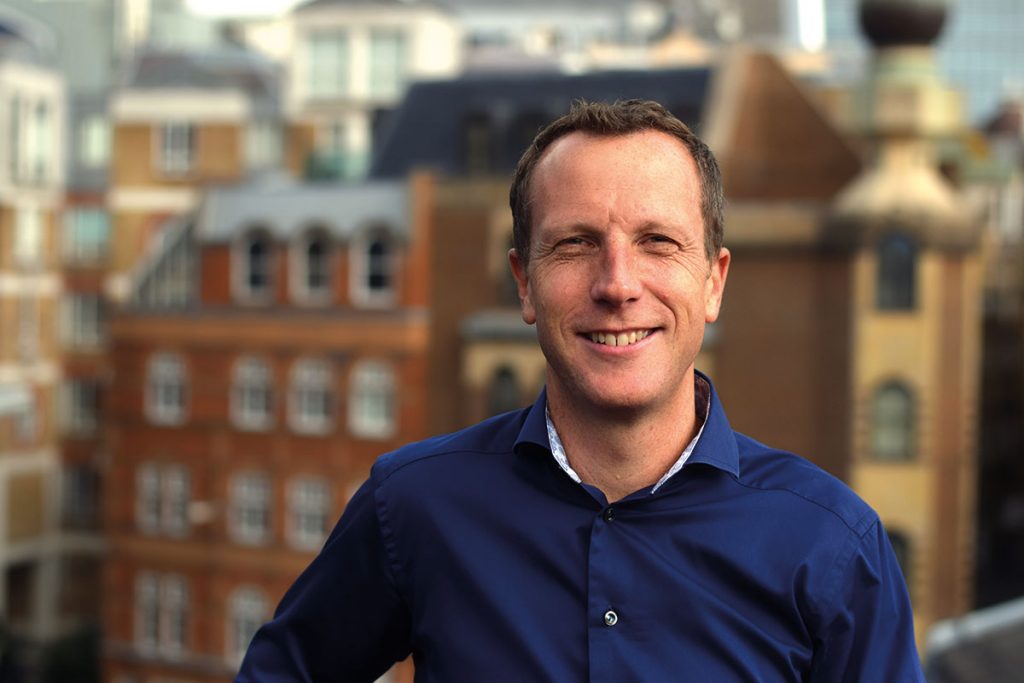
After more than 40 years of operation, DTVE is closing its doors and our website will no longer be updated daily. Thank you for all of your support.
Here’s looking at YouView
 Ahead of receiving the award for Services to Broadcasting at this year’s Content Innovation Awards, YouView’s outgoing CEO Richard Halton talks to DTVE about the evolution of YouView and what the future holds. Andy McDonald reports.
Ahead of receiving the award for Services to Broadcasting at this year’s Content Innovation Awards, YouView’s outgoing CEO Richard Halton talks to DTVE about the evolution of YouView and what the future holds. Andy McDonald reports.
YouView CEO Richard Halton is due to step down at the end of the year, bringing to a close a 10-year period where he worked to turn the company from an idea to a fully realised TV platform that is now found in three million set-top boxes and digital devices across the UK.
Project Canvas was first announced in late 2008, was formalised in 2010 and finally came to market as YouView in 2012. Backed by a powerful consortium of operators (BT, TalkTalk), broadcasters (the BBC, ITV, Channel 4, Channel 5) and the UK’s main infrastructure provider (Arqiva), the hybrid IP-broadcast platform was devised as a way to “future-proof television” by harnessing the scale of its partners.
As Halton prepares to pursue new opportunities in the industry, he looks back on his career, the evolution of YouView and discusses what the future might hold for the platform as the industry continues to adapt to the power of the internet.
Canvas comes of age
Halton started his career at the BBC as a new media strategy analyst in 1999, after a short stint at Andersen Consulting, which became Accenture. Starting out in the BBC’s core channels business, he rose quickly and was part of the launch team for BBC Four and BBC Three in 2002 and 2003. By his late 20s he was on the board of BBC Television and when Mark Thompson became director general in 2004 he led the BBC’s ‘Creative Future’ programme – a blueprint for using new and emerging technologies that was unveiled in 2006. After this, he took responsibility for the BBC’s commercial strategy.
This all paved the way for Halton’s role as programme director for Project Canvas, though as he now admits, “there were so many moments, particularly in the first couple of years, where it just felt like it couldn’t, shouldn’t, wouldn’t happen.”
The first challenge was getting Canvas’ partners to believe in the idea. As partners came on one by one – the BBC, BT and ITV first – Halton says it took about a year to get the group together and convince everyone it could be a success. A further year was later spent trying to convince the rest of the industry that the endeavour wasn’t anti-competitive.
Canvas overcame four different regulatory processes, succeeding where others failed. In 2009, Project Kangaroo, the working title for a joint video-on-demand platform proposed by BBC, ITV and Channel 4, was blocked by the Competition Commission over the same fears that were raised only a year later about Canvas – that it could be too powerful and hurt competition.
Canvas was broadcasters and operators pooling together to create a TV platform – something Halton says was “almost a bigger challenge” than Kangaroo because it was out of the comfort zone of the shareholder companies to some extent. However, this being the case, it was also less of a threat to the competition authorities.
Canvas’ eventual launch came in 2012 after a difficult development process. “There were all sorts of major obstacles in terms of the technology that we had to overcome during that period,” says Halton. “We launched with Humax; they weren’t the launch partner for the box 18 months before that. We had a whole set of infrastructure built by Accenture; they weren’t the company that we’d originally planned to work with to build the service.”
However, in YouView, the project’s founders achieved what they set out to do. “We thought at the time about a platform that would democratise access to the television screen,” says Halton. “That would maintain an open platform for content, protect the future of free-to-air television, innovate in terms of the user experience and come up with this very beautiful, very simple consumer proposition. Those are very big ideas”
YouView and beyond
Fast-forward to today and YouView has evolved and grown both its footprint and its product offering since its debut. The platform has also been modernised, with a major revamp in 2016 moving much of the platform’s functionality to the cloud, making it easier to add and update features and introducing a new user interface in the process.
Since the cloud revamp, the company has doubled down on data collection and earlier this year revealed it is collecting 370 million anonymous data points a day, gaining insights into how viewers use the YouView interface and how audiences discover and watch linear TV, recorded and on-demand programming. YouView is also trialling an advertising technology platform with the UK commercial broadcasters, placing IP-delivered ads into the broadcast stream.
On the content front, YouView is home to a growing number of digital services alongside its line-up of free-to-air linear channels. Now TV and Amazon Prime Video are both being co-opted into the platform, Netflix is already there and YouTube is expected “in the fullness of time”. Smaller services are also finding a home on YouView, like the recently launched kids VOD platform Ketchup TV.
Technology-wise YouView did a trial with the BBC this summer to deliver 4K World Cup and Wimbledon coverage using Dynamic Adaptive Streaming over HTTP (DASH). While today’s generation of 4K YouView boxes are not high dynamic range (HDR) compliant, Halton says that its 4K DASH trial essentially met similar colour space requirements as HDR. Elsewhere, the company started piloting Amazon’s Alexa voice service in June 2017 to bring voice controls to its connected set-top boxes, establishing it as an early-mover in this space.
Allowing users to power their YouView boxes with Amazon Alexa devices is just one sign of how the platform is looking to adapt and change to new and emerging trends in the wider TV industry. “I think if you look at YouView in the future you will see that sense of YouView as an environment extending across multiple devices,” says Halton, discussing the future direction of the business. “I think that idea of YouView as an ecosystem, before the word ecosystem was over-used, has always been very powerful. We want to enable people to discover this huge range of content in lots of different ways on lots of different devices.”
Since YouView’s launch, new streaming devices like Google’s Chromecast, Amazon’s Fire TV and Roku’s players have made it easier than ever to watch online content on the TV. However, what these devices don’t in most cases offer is on-demand services alongside linear TV. For Halton, the sweet spot is the single platform that offers both in one place.
While viewing habits are changing, the majority of British viewing time is still on live linear television and Halton says that the set-top box is a “far more resilient beast than anyone gave it credit for”. However, that’s not to say that YouView will be set-top box dependent. “YouView has evolved and keeps on evolving in a way that’s agnostic to the technology. That means deploying on different devices; it also means taking advantage of new distribution technology.”
The future direction of the TV industry seems clear, and it’s internet-connected. The BBC’s chief technology and product officer, Matthew Postgate, predicted at this year’s DTG Summit that all media will be delivered over the web in the not too distant future and called on the UK industry to come together as we move into this IP era.
Halton says: “I think the YouView proposition of all your great content in one place, all the broadcasters and networks working together to make that happen, to future-proof British television, is a mission that is entirely compatible with where Matthew sees not just the BBC going, but the way the industry is going”.
As Halton prepares to step away from YouView, what comes next for the executive? He plans to take a bit of time out at the end of the year, after which he says he is keen to stay within the TV industry, though he is not ready to announce anything yet.
“My background is in business strategy and for eight years I’ve had a very operational CEO role. But I think what I’m really interested in is the combination of the two,” he says. “There’s no business in our industry right now that isn’t grappling with big strategic challenges, so I think it’s impossible to be in a leadership role where you’re not thinking hard about how this industry evolves.”


